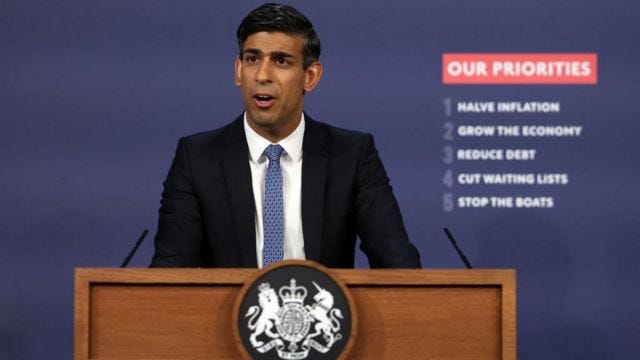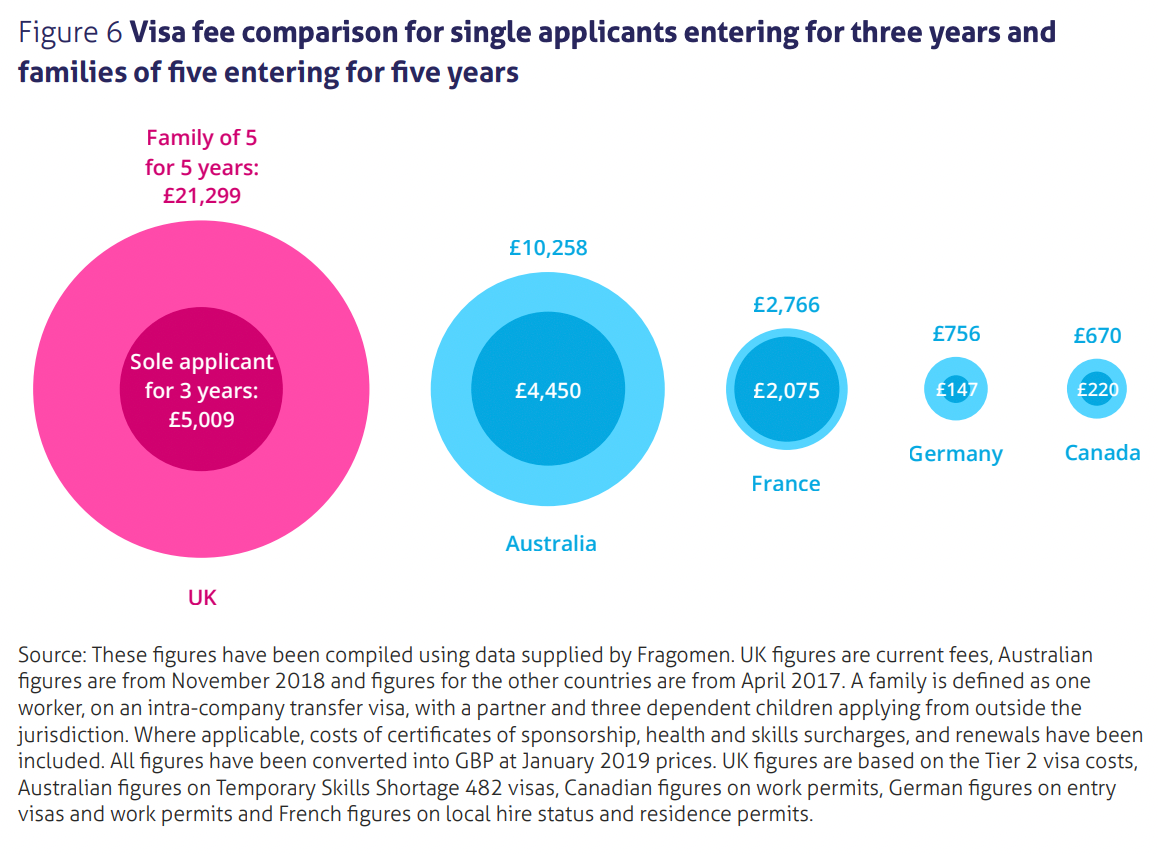Sunak's decision on immigration fees is self-defeating
Migrants make the UK a more productive and innovative country.
UK Prime Minister Rishi Sunak announced last week that the Government will hike visa fees to fund increasing public sector pay. The deal came after a months-long battle between the Government and trade unions that represent the public sector workers, which included hellish strikes in hospitals and schools. Even though it’s good to see that strikes will calm, the way Sunak’s Government plans to pay for this deal is self-defeating and shortsighted.
Chancellor Jeremy Hunt said that ministers would have to find “an additional £2bn this year and £3bn next year from department budgets to fund” the decision. The first place they looked to get some extra money was migrant workers. The Treasury announced that £1.4bn would be raised over two years by increasing visa fees for migrant workers.
A 15% fee increase is expected for work and visit visas; and 20% for study visas, sponsorship certificates for businesses and other categories. Migrants’ annual NHS “surcharge” will also increase by 66% to £1,035. Sunak attempted to defend this decision by pointing at inflation and the “rising prices”. But, if we are not using Turkey’s inflation data for an unknown reason, these hikes go far beyond that.
When spending increases, somebody has to pay for it. And when inflation eats up public sector pay, the Government needs to compensate. This is all fair. However, visa fees should’ve been one of the last places to get this money from — they are already too high, uncompetitive internationally and economically self-harming.
Migrants are natural entrepreneurs
Let’s begin from the end and make the economic case for migration first. According to The Entrepreneurs Network data (where I am currently leading an international project on what the world’s most pro-innovation visa system would look like), even though just 14% of UK residents are foreign-born, 49% of the UK’s fastest-growing businesses have at least one foreign-born co-founder. In 2019, 9 of the UK’s 14 startup unicorns had at least one immigrant co-founder and among the top 100 fastest-growing startups, those with migrant co-founders received a combined £3.7bn in investment.1 While they create thousands of local jobs, these companies and migrants make the UK a more productive and innovative country.
Immigration works almost like a self-selection process to find promising entrepreneurs. Research has shown repeatedly that individuals who are exposed to different cultures can be more innovative in finding new business opportunities, and people who take the risk of migrating are more prone to entrepreneurship than conformist duds.
Elon Musk of Tesla, Sergey Brin of Google, Nikolay Storonsky and Vlad Yatsenko of Revolut, and Ali Parsa of Babylon Health all have at least two things in common: they are remarkably successful entrepreneurs and all of them are immigrants. It’s not just empirical, hand-picked examples that show the migrants’ potential as innovators. There is data.
A 2018 study by the National Foundation for American Policy estimated that immigrants founded or co-founded 55% of the US’s billion-dollar companies. Immigrants in the US currently represent about 14% of the workforce but account for closer to one-quarter of new patents. They start firms at higher rates than natives and 25% of recent start-ups are founded by immigrants.
Attracting talent is essential for a modern economy…
Attracting talented people to come and work in the UK should not only be a source of pride, it also makes economic sense. Like many advanced economies, the UK needs highly skilled people to lead the way in its complex industries that generate most of the economic dynamism. Clearly, Britain’s local talent pool isn’t enough for these companies hence they are looking outward for jobs that require certain skills and grit.
For Google, bringing people to the UK isn’t the most difficult of tasks. They have the resources, legal and HR departments to take care of all the costs and bureaucracy. However, the need for skilled people doesn’t stop at Big Tech. Startups and small and medium-sized businesses also need to hire great people to grow, but they are increasingly failing to find them:
90% of employers think school leavers aren’t prepared for employment. And 66% of scale-up CEOs rate ‘access to talent’ as very important or vital to their growth, with one-third rating it as their top priority. And it isn’t just employers complaining: two-thirds of parents don’t believe the education system is preparing children for the workplace.
This shouldn’t be a surprise. The world and, especially, the world of work is changing drastically. Most nations are falling behind and the UK isn’t immune to this. The World Economic Forum estimates that half of the UK workforce will need some sort of re-skilling till 2025 if they are to stay as productive. McKinsey makes the case in the UK for re-skilling and re-training policies, which could benefit the overwhelming majority of employees and employers. However, public policy didn’t go far enough yet and thus executives in the UK are worried about access to talent. That’s why the UK needs to bring talent over.
… and uncompetitive fees aren’t helping
But the sheer financial cost of doing this is already disincentivizing most of the British companies to hire immigrants. Currently, companies must pay for a sponsorship licence to employ migrants and the fee of doing so can go as high as £1,476. They must pay a visa application fee, an annual health surcharge for the employee and their dependents, and often, there’s also an ongoing immigration skills charge, £364 for smaller companies and £1,000 for medium-sized and larger companies. In the past decade, rather than going down due to businesses’ needs, the costs of some visas increased by 500%. (And this is before counting in the new fee hikes.)
As if this is not enough, Home Office delays can make this process take up to 8 weeks, if lucky. There are cases of entrepreneurs, whose ideas were endorsed by independent bodies and investors, that had to wait for over six months to get the Home Office’s approval. If you are trying to build or grow a company in a competitive environment, these barriers will make bringing talent over too costly. Most startups don’t even dare to apply for a sponsorship licence, let alone hire from overseas.
Britain’s economic competitors are better placed on these issues. According to a 2019 Institute for Government report, UK visa fees are often more than double of Australia, around seven times as much as of France, and around 30 times of Canada. And Gallup reports that all of these countries are already more desired destinations for potential migrants than the UK. If the British Government is trying to get even more uncompetitive, it’s finding new ways to achieve this.
This is mostly happening because of wrong incentives within the Government’s structure. The Home Office is trying to fund the visa system via visa fees, making up to 800% profit on some of the schemes. This way, migration is more of a financial and bureaucratic chore for the department and not an investment to detect and attract new talent. However, if seen as an investment, the productive and innovative immigrants’ contribution to the UK economy would be more than enough to compensate for visa fees.
Overall, migrants contribute greatly to the UK’s booming innovative industries and the country needs more international talent. The current visa system is already too costly and bureaucratically tiring for businesses. Sunak’s Cabinet should’ve been trying to reduce costs, not hike them further.
We will publish an updated version of this report soon. Subscribe to The Entrepreneurs Network’s newsletter to hear about it first.





